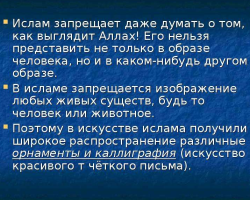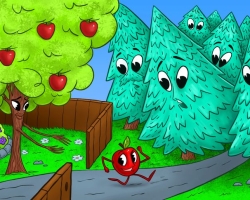Phraseologism “I Give Good” appeared a long time ago. It denotes "resolution." Read more in the article.
Content
- "I give good": the origin of phraseology
- What does it mean, how to understand the expression “give good”: an explanation of phraseology, in a word
- "I give good": a short direct and figurative meaning of phraseological unit
- How to make a proposal with phraseology “I give good”: examples
- How to choose a synonym for phraseological units “I give good: to approve, agree, allow, allow
- Video: Russian lessons. Sources of phraseological units
The Russian language is “great” and “mighty”. It has words with which you can simply convey the meaning of what you want to say. But there are also phrases that do not correspond to the words used in them. Such phrases are called phraseologisms.
Read in other articles on our website about the origin of such phraseologisms as: "Rale your nose" and "Hang your nose". You will also find out what direct and figurative meaning of these words.
This article describes the origin of the phraseology “I give good”. You will also learn what this phrase means, and learn to make proposals with it. Read further.
"I give good": the origin of phraseology

Options for the origin of phraseology "I give good" several. According to one version, in the pre -revolutionary language the letter "D" It was called "good". The signal flag of the Navy with a similar letter denoted: "Allows", "allow". It was yellow and denoted permission to move. Quite often a word "good" It was also used in conversation as personification of consent and permission.
Example:
- - Yashka, take a chervonets to pay. I'll give it to Wednesday. Good?
- - Good.
In the future, phraseology "Give good" He strengthened in military everyday life, almost always denoting the consent and approval of a higher rank for any actions of subordinates:
- "The commander gave the go -ahead to visit home"
- "Command gave the go -ahead"
As for the derivative phrase "Customs gives good", it appeared much later, in the film "White sun of desert".
However, the phrase is also not devoid of logic. Despite the fact that in the cinema it was used more in a figurative sense, the expression “customs gives good” corresponds to a completely typical situation. Customs officers allowed to cross the border to those who went through a thorough check, inspection. Similar is carried out at the entrance and departure from countries to this day.
What does it mean, how to understand the expression “give good”: an explanation of phraseology, in a word

This phraseology "I give good" means: "Allow, allow". This is an explanation of this phrase in one word.
"I give good" -This is always approval on any actions. From the expression “give good” - approve, give consent, phraseologism also comes "Get good" - To acquire permission, authority.
"I give good": a short direct and figurative meaning of phraseological unit
To understand what this or that phraseologism denotes, it is necessary to understand its short direct and figurative meaning. Here is an explanation for the phrase “I give good”:
- "I have commanding good in my pocket" -the figurative value indicating that the person received approval, permission from the commander for any actions.
- "Give good advice" - Direct importance of the expression "give good." Also, the word "good" has a common root with the word "approval", which is one of the main meanings of phraseology.
- "Give good" “In this case, the question of“ voluntariness ”or the violence of actions takes place:“ If they are not given good (voluntarily), we will take it by force. ”
- Agree - “Mother gave the good to her son to marry, although it was not quite agreed with his choice. She frankly did not like Anna. "
- "Give good" (reward in material terms): “I gave a lot of different good to refugees and poor” - direct importance.
- "Give a good deed to be allowed to happen" - Another synonym for the words “give good”, figurative meaning.
- Another of its indirect meaning: "God gave a good deed to be" (allowed to happen good).
- "Do good deeds", “He gave a lot of good to this world, but in return he heard only reproaches. No one appreciated his actions. So he died in poverty and loneliness, as an hour came ” - at the same time, both direct and indirect significance.
Phraseologism itself implies a figurative meaning. Indeed, if you regard the good as the quality of a person, as the ability to do good to others, it cannot be conveyed, put in a pocket, like a thing.
How to make a proposal with phraseology “I give good”: examples

To consolidate the material covered, let's make sentences with phraseology. To do it is simple, as with other phrases. How to make a proposal with phraseology “I give good”? Here are examples:
- “True, the bodies of the sanitary and epidemiological service reluctantly give the good to install the owners of the coastal real estate of cleaning systems.”
- “Both of the main engines were jammed, and the captain gave the go -ahead to plunge overboard.”
- “With their behavior, animals have always helped people, warned them or, on the contrary, gave good for decisive actions.”
- “I myself will become and the owner of the cherished passport, and the border guard, giving good to the entrance.”
- “Since the author gives the good for publication, he must read the entire contract, even what is written in small print. The publishing house is not responsible for the inattention of writers. ”
As you can see, mainly phraseologism is used in Russian speech in a figurative, indirect meaning.
How to choose a synonym for phraseological units “I give good: to approve, agree, allow, allow

To make a proposal, you need to be able to select synonyms for words and phrases. This helps to more accurately convey the thought. How to choose a synonym for phraseological units "I give good"? Here's the answer:
Approve
- The command gave scouts good (approved) to study the territory.
Agree
- Father gave Peter the Good to lead the company. He was not sure of the honesty and competence of the offspring, but a rapidly developing disease did not provide alternatives, he agreed. Vasily Ivanovich had no other successor.
Allow
- - Vaska, let's dive on the pier!
- - But they will not swear?
- - No, my mother spoke to yours now, she gave good, allowed you to come with me. We can go together. No one will scold you.
Allow
- - Comrade Lieutenant Colonel, I understand perfectly well that during the investigation of this case I was temporarily suspended from work. But let me investigate the crime with the rest. I have personal scores with this smugglers.
- - Okay, Zharov, I give good, I allow. But look for me so that without stupid things there. I do not need from the ministry.
Bless
- - I give you good, my children, I bless. Although I do not fully approve of your decision to combine marriage so early, but what to do with you? You won’t back up anyway. Seeing youth went now, early -grown. Tip you and love.
Sanction
- - Valery Ivanovich, but can I come tomorrow, I promise that I will learn everything and pass the test at least for the “Trochka”?
- - Excuse me, Kirilenko, I'm powerless. In addition to my economic and mathematical modeling, you have 5 more debts in other disciplines. As far as I know, the dean and the rector have already given the go -ahead for your deduction. Alas, I do not decide anything here.
Give permission, give permission
- Despite the fact that the rest of the groups had many more experience, we still passed the qualifying tour and they gave us the go -ahead, permission to perform in the club. Probably, so that we gain this very experience. Since I know for sure that at the next stage of the competition we will fly out - there such “bison” gathered, in comparison with which we can neither sing nor playing really.
Now you can learn the topic on this phraseological unit and understand how to make proposals with it and what it means. Good luck!
Video: Russian lessons. Sources of phraseological units
Read on the topic:







